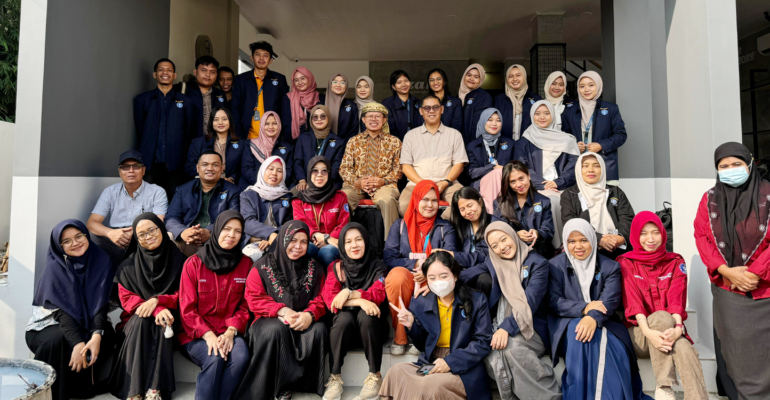IPB University Students Observe the Implementation of UKM Food Safety to Support Community Empowerment

Master’s (S2) and Doctoral (S3) Students of the Department of Nutrition – Graduate School (SPs) of IPB University organised field activities in order to observe the implementation of food safety in the Small and Medium Enterprises (UKM) industry as a result of community empowerment on 4/6.
Four UKM industry players involved in field activities include PT Azaki Food International (AFI), CV Shaza Food, CV Madu Apiari Mutiara and CV Puspita. The activity was accompanied by Prof. Ahmad Sulaeman in providing suggestions for improvements for industry players and improving students’ critical analysis skills in food safety.
“Food if it is not safe, it cannot be called food. So, food products must implement a food safety system,” said Prof Ahmad. He revealed that Tempe Azaki which is the superior product of PT AFI which produces fresh tempe, frozen tempeh, and tempe chips has shown its commitment to food safety through the implementation of HACCP FSC 00100, SNI 3144:2015 and has been certified Halal Assurance System (SJH).
“Of course, routine audits, strict implementation of operational standards (SOPs), and efforts to achieve trade product standards cannot be separated from the quality assurance and food safety sold. The return system has also been implemented if the product is damaged to continue to maintain trust in consumers,” explained Prof Ahmad.
Prof Ahmad emphasised that food safety is the key to a product that can be accepted by consumers, especially consumers in other countries. “This visit is expected to provide an overview of the importance of food safety in the SME industry which is still developing,” he said.
Meanwhile, CV Shaza Food which was founded by Erni Rahman, an alumni of IPB University, has hired 130 surrounding communities to drive the wheels of the family economy. “This cireng business was established in 2013 and currently the turnover has reached Rp 1 billion per month. Shaza Food products have been tested according to halal certification test standards. Fulfilment of legality and food quality safety in the production process is not only a must but also as the responsibility of the business owner,” said Erni.
Another SME, CV Puspita, succeeded in producing drinks with healthy and fresh brands through soy juice products and mango fruit extract drinks. “In its commitment to maintain food safety, Puspita Group has implemented strict quality standards in every production process to retail at the retailer level,” said Riyadin, CEO of CV Puspita.
She said, by applying strict quality standards in every production process, Puspita Group is committed to producing fresh beverage products that are safe and of high quality.
The next UKM is CV Madu Apiari Mutiara in Cimanggis, combining tradition and modern technology. Various certifications that have been obtained include the certificate of Household Industrial Food Products (SPPIRT), CPPOB (How to Produce Good Processed Food), CPOTB (How to Produce Good Traditional Medicine), NKV (Veterinary Control Number), CPKB (How to Produce Good Cosmetics), and halal certification. (IAAS/IAN)



